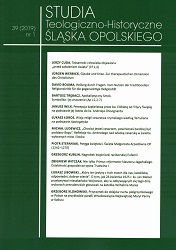„Który ten jedyny z tych trzech dla nas, katolików, odpowiedni, dobrze wiecie”. O tym, jak 26 kwietnia 1925 r. ks. Jan Melzer przekonywał mieszkańców Wojnowic, aby w odbywających się tego dnia wyborach prezydenckich głosowali na katolika Wilhelma Mar
“Which one of those three is suitable for us, Catholics, you know well”. On how Rev. Jan Melzer convinced the people of Wojnowice to vote for the Catholic candidate, Wilhelm Marx, in the presidential election in Weimar Republic, on April 26, 1925
Author(s): Łukasz LibowskiSubject(s): Christian Theology and Religion, Political history, Politics and religion, Interwar Period (1920 - 1939), Sociology of Religion
Published by: Uniwersytet Opolski
Keywords: Rev. Jan Melzer; Wilhelm Marx; presidential elections in Weimar Republic (1925); Church and politics; political sermon; argumentation; kinds of argumentation;
Summary/Abstract: This paper presents the arguments, by which Rev. Jan Melzer tried during a sermon on April 26, 1925, to persuade the faithful entrusted to him to vote for Wilhelm Marx, a Catholic candidate for the Weimar Republic presidency. In the first part of the text the arguments are presented, by which Melzer reasons them into a careful and well-thought participation in the election. There are two arguments: the first one is based on the importance of the election, the second on the fact that the campaign was full of deception. In the second (main) part of the text the arguments are set forth, by which Melzer attempts to convince his audience to a very specific action, namely to vote for the Catholic. Among the arguments there are two sub-groups: the first one consists of general arguments (i.e. not pertaining to the candidates in person), the second one consists of those arguments that refer to the candidates’ characteristics or competence. In the first sub-group there are the arguments: from fidelity to one’s conscience, from the obligation, from the (priest’s and bishop’s) authority, and the one from the necessity to compensate for unknown events that happened in Wojnowice on April 19, 1925. The second sub-group consists of only one argument from the “nature” of the candidates; it is in two versions: negative and positive. The paper is concluded by three summarizing notes.
Journal: Studia Teologiczno-Historyczne Śląska Opolskiego
- Issue Year: 39/2019
- Issue No: 1
- Page Range: 211-238
- Page Count: 28
- Language: Polish

